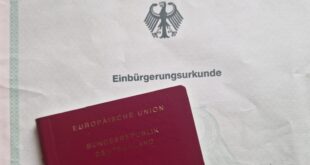New entry regulations that make life easier for travellers entered into force on Thursday. The new regulation is the most far-reaching relaxation of rules for arriving passengers since the beginning of the pandemic in Germany last year. The federal cabinet passed the new rules, which are also intended to standardise the regulations of individual federal states and make travelling within Europe easier this summer, on Wednesday.
——–
Due to falling coronavirus infection figures throughout Europe, the German government has removed a major hurdle to travelling for summer holidays abroad: with a regulation in force since Thursday (13 May), it has lifted the general quarantine requirement for entries from more than 100 countries.
The federal government distinguishes between those fully vaccinated against the coronavirus and those who have recovered from from COVID-19 infection and have been tested. Also between four groups of countries: virus variants areas, high incidence areas, risk areas and “risk free” areas.
- Risk areas are countries where the seven-day incidence is above 50. Currently, 102 countries worldwide are fully or partially so classified, including 18 of the 26 EU Member States except Germany.
- High-incidence areas are countries with more than 200 new infections per 100,000 inhabitants in seven days (seven-day incidence). This category includes 44 countries.
- Virus variant areas are countries with widespread occurrence of COVID-19 variants of concern.
From Thursday, May 13, the following rules apply nationwide:
For vaccinated and recovered persons:
– The quarantine and testing obligation is waived for entries from risk-free areas, risk areas and high-incidence areas,
– A 14-day quarantine obligation remains for entry from virus variant areas (areas with widespread occurrence of COVID-19 variants of concern),
Who is considered vaccinated? People who have achieved full vaccination protection are considered vaccinated. According to the regulation, this is the case when at least 14 days have passed after the last required individual vaccination – usually after the second injection. The vaccinated person must be able to provide proof on paper or digitally in German, English, French, Italian or Spanish. Only those who have been inoculated with a vaccine currently approved by the EU – including the BioNTech / Pfizer, Moderna, AstraZeneca and Johnson & Johnson vaccines – will be considered vaccinated.
Who is considered to have recovered? According to the new regulation, people are considered to have recovered if they have survived a coronavirus infection and can prove this with a positive PCR laboratory test that is at least 28 days and at most six months old. People whose illness occurred more than six months ago are not considered recovered for the purposes of the regulation.
For non-vaccinated persons:
– Travellers entering Germany from risk areas can avoid the quarantine obligation if they can prove that they have recently tested negative for the virus; rapid antigen tests (not older than 48 hours) or PCR tests (not older than 72 hours) are acceptable.
– There is still a quarantine obligation for travellers entering from high-incidence areas. They are required to self-isolate upon arrival and wait at least five days before taking a coronavirus test to release themselves from quarantine
– The 14-day quarantine requirement remains in place for entry from virus variant areas. There is still no exception here: even vaccinated and recovered persons have to isolate themselves too.
The regulation requiring travellers to take a COVID-19 test before departure for Germany, regardless of the infection rates in the country where the flight originates, is still in force. Airlines are only allowed to let passengers onboard when they show proof of a negative test, according to the rule.
Femi Awoniyi
READ ALSO Germany now requires negative Covid-19 test from all air passengers arriving
 THE AFRICAN COURIER. Reporting Africa and its Diaspora! The African Courier is an international magazine published in Germany to report on Africa and the Diaspora African experience. The first issue of the bimonthly magazine appeared on the newsstands on 15 February 1998. The African Courier is a communication forum for European-African political, economic and cultural exchanges, and a voice for Africa in Europe.
THE AFRICAN COURIER. Reporting Africa and its Diaspora! The African Courier is an international magazine published in Germany to report on Africa and the Diaspora African experience. The first issue of the bimonthly magazine appeared on the newsstands on 15 February 1998. The African Courier is a communication forum for European-African political, economic and cultural exchanges, and a voice for Africa in Europe.































